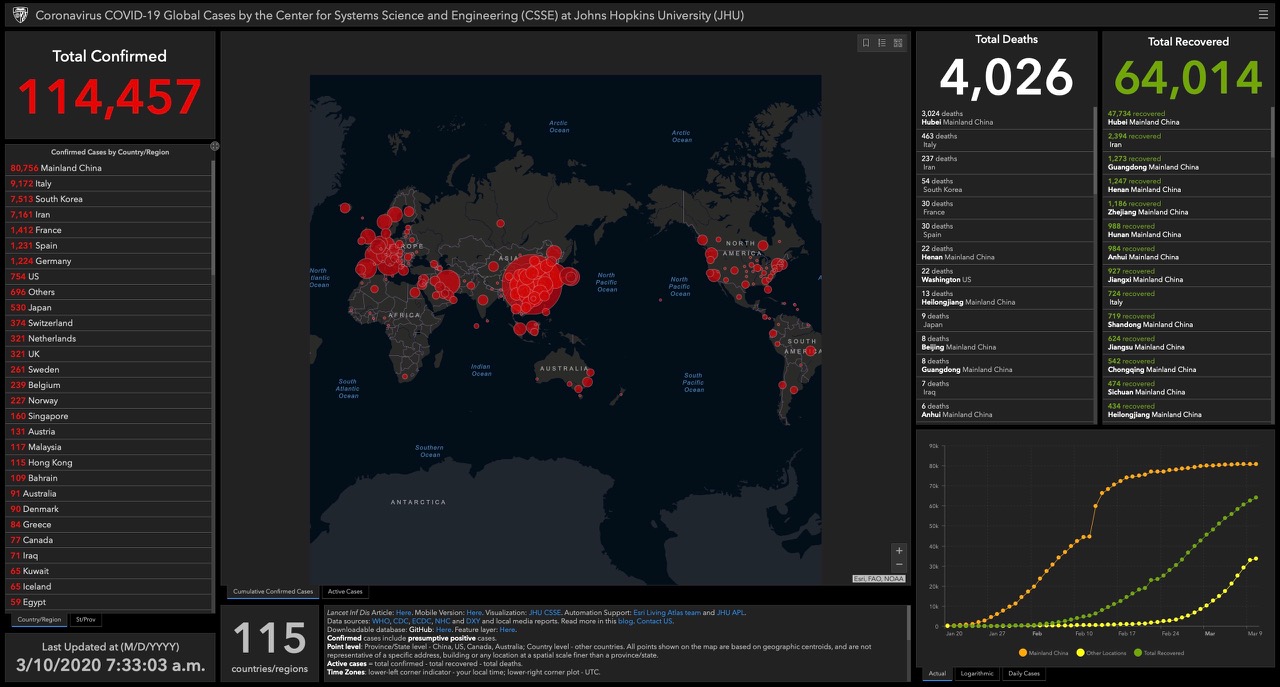Tuesday 10 March 2020

The situation this morning – 10 March 2020 (courtesy Center for Systems Science and Engineering at John Hopkins University)
I went into a local supermarket today as I had run out of milk. I am a lactophile and as distant from lactose sensitivity as it is possible to be. I simply love the stuff. I cannot envisage a planet without cows. But when I needed a resupply, my worry was how to enter and exit a busy supermarket while minimising my chances of cross-infection.
As I walked the short distance from my apartment to get there, I noticed how wide a berth all pedestrians were giving each other, and especially me. I felt rather like a leper. See another person? Turn your back, pretend to gaze into a shop window, as the important thing is to take Covid-19 precautions without appearing to make a fuss.
For me, it is simple. I make a fuss and stand out in the process. I decided mid-morning would be best, as it was likely to be less busy. I weaved my way like a snake, first near the road, sometimes on the road, and on occasion hugging shop windows, to keep at least a metre from anyone else.
Once in the supermarket, which had automatic doors, I donned my outdoor gloves – don’t ask me why I did not put them on outdoors – and headed for the milk counter. When I reached it, I saw a woman doing the same. Not the gloves but the milk. Normally, we would both grab a bottle simultaneously. The shelves are sufficiently wide to do that. Not this time.
“After you,” she said, from a safe distance of at least five metres.
“After you,” I replied, indicating the milk shelf before us with a d’Artagnan-like sweep.
The woman, somewhere in mid-thirties, took the plunge. Grabbing two five-litre cartons, one in each hand. She leapt in, then out, like a perfectly co-ordinated ballerina, and dumped the cartons into her otherwise empty trolley. I sensed she was holding her breath. She then turned and headed for the checkout while I kept my five-metre distance.
You can expect such behaviour in my area of London as I am surrounded by hospitals and healthcare facilities of all sorts. There was a good chance the woman diving in and diving out was a healthcare worker. She seemed easily familiar with staying clean, unlike in other parts of London where folk still seem to be coughing and sneezing openly. Yesterday, I even saw one passer-by spitting on the pavement.
After retrieving my milk in gloved hands, I then made an error. I decided to buy some potatoes. Nothing remarkable, just a few spuds. What I did not realise until I reached the vegetable section was that individual potatoes, those big ones that bake perfectly, have to be weighed on a scale nearby so that a sticky label with the price can be printed out. That scale cannot be operated in a gloved hand. It requires skin contact on a touchscreen, or a stylus I did not have.

Are you sure you want to touch that screen (courtesy Sitthiphong)
That set me thinking, and I can see why the screens of mobile telephones are now in question and we are supposed to clean them twice each day. Rumour has it that the virus can live up to 96 hours on a screen. Supermarket potatoes, certainly in the supermarket near me, require bare hands for purchase. Outdoor gloves do not work.
Every delivery I take also requires me to sign a miniature screen with my finger. The coronaviruses must be beside themselves with glee. There are so many weak links in the keeping-clean process, that you need eyes in the back of your head.
I talked again with my favourite check-out girl as I paid up for my small purchase.
“You OK?” I asked.
“For the moment,” she replied, and with that I was gone. My total time in the supermarket, milk and potatoes in hand, was less than five minutes. Next time I will try to be quicker.

Dr Daniele Macchini (Bergamo, Italy), who wrote some powerful words (courtesy Humanitas Gavazzeni Hospital)
As the Covid-19 crisis gathers speed in UK, I have a strange combination of worry and happiness. I cannot explain the mixture. One thing has brought the worry home, however. It has shown me what is likely around the corner. It was an article in a national broadsheet, based on a Facebook post by a doctor working in northern Italy. They were the words of a Dr Daniele Macchini, who works in the city of Bergamo, where I was meant to be lecturing on 29 March 2020, and the home of Atalanta Football Club. That meeting has now been cancelled. This is what he said, albeit translated from the Italian, and edited for length, in a post that was shared more than 29,000 times:
“I understand the importance of not generating panic, but the gravity of this situation is not well understood, and I shiver when I hear people saying they don’t care or complain because they cannot go to the gym or play football.
I myself was shocked to see the total reorganisation of the hospital over the past week: the wards slowly emptied, non-urgent activities interrupted, the intensive care unit given over to make room for more beds.
I remember how I spent my night shift a week ago nervously waiting for a call from the microbiology department waiting for the response of the test on the first suspected case in our hospital and thinking of the possible consequences for us.
If I think again about that night, now that I see what is going on, my anxiety at a single case seems ludicrous. It is reductive to call the current situation dramatic, but I have no other words. The war has literally exploded, and the battles are relentless, day and night.
People show up at the hospital one after the other. They have nothing like the problems caused by seasonal flu. They can’t breathe, they need oxygen. There aren’t many therapies for this virus. It depends mainly on your body. What we can do is simply support the body when it can’t keep up anymore. Now we dramatically need those beds. All the emptied wards are being filled again at an incredible pace.
The boards with the names of the patients, with different colours for each different unit, are all red and the diagnosis is always the same: bilateral interstitial pneumonia. There are no longer surgeons, urologists, orthopaedists – we are all just doctors trying to fight the tsunami that crashed on us. The number of cases is rising, with 15 or 20 new patients every day for the same reason.
The results of the tests come one after the other: positive, positive, positive. Suddenly the emergency room is on the brink of collapse. The symptoms are always the same: high temperature and shortness of breath, high temperature and cough, shortness of breath. Some need to be intubated and sent to the emergency care unit already. For others, it’s just too late…
The staff are literally exhausted. Social life is suspended for us. For almost two weeks, I voluntarily decided not to see my son or family members, for fear of infecting them and consequently infecting elderly relatives with other health problems.
So, you should be patient, too. If you can’t go to the theatre, museums or the gym. Try to have mercy for all the older people you could exterminate. We have no alternative (but to be here). It is our job…in the end we only try to be useful for everyone. Now, try to do it too.
With our actions, we influence the life and death of a few dozen people.
With your actions you could influence many more.”
Wow. That was a serious description of a serious situation. I wonder if he realised when he wrote it, the strong message he was sending to the world? All credit to him.
I went to another meeting in the evening. This time it was a charity seeking to raise funds for injured soldiers and their families. There were only 18 people present. Clearly plenty of folk were worried by attending, as the charity had worked on at least 30 appearing. I kept my distance in a decently sized room and declined the openly offered handshakes. In exchange I used an elbow bump, although was surprised that for many this was unexpected. I left there clear in my mind that there is still work to do, ensuring the general public understands sterility.
The rest of the world continues to struggle.
Troops have been sent to a New York virus containment zone, EU leaders have promised to protect their economies, the World Trade Organisation has suspended all its meetings until at least 20 March after a staff member became infected, and travel has been restricted across all of Italy. President Trump is coming out with all manner of statements, many of which I do not fully understand. It is said that he is to be tested for coronavirus as he has been interacting with self-quarantined lawmakers. I wonder if we will be told the result? Meanwhile Iran is also having a rough ride, with 54 deaths in the past 24 hours, its highest figure to date.
Airlines are having an especially tough time of it. EasyJet and Ryanair have cancelled all flights to Italy, Korean Air has said that it cannot guarantee its survival, British Airways staff are being asked to take voluntary unpaid leave, Norwegian Air has cancelled 3000 flights, and United Airlines will be cutting capacity by a fifth in May.
Watch those spaces, I suspect. Not all businesses are going to survive.
